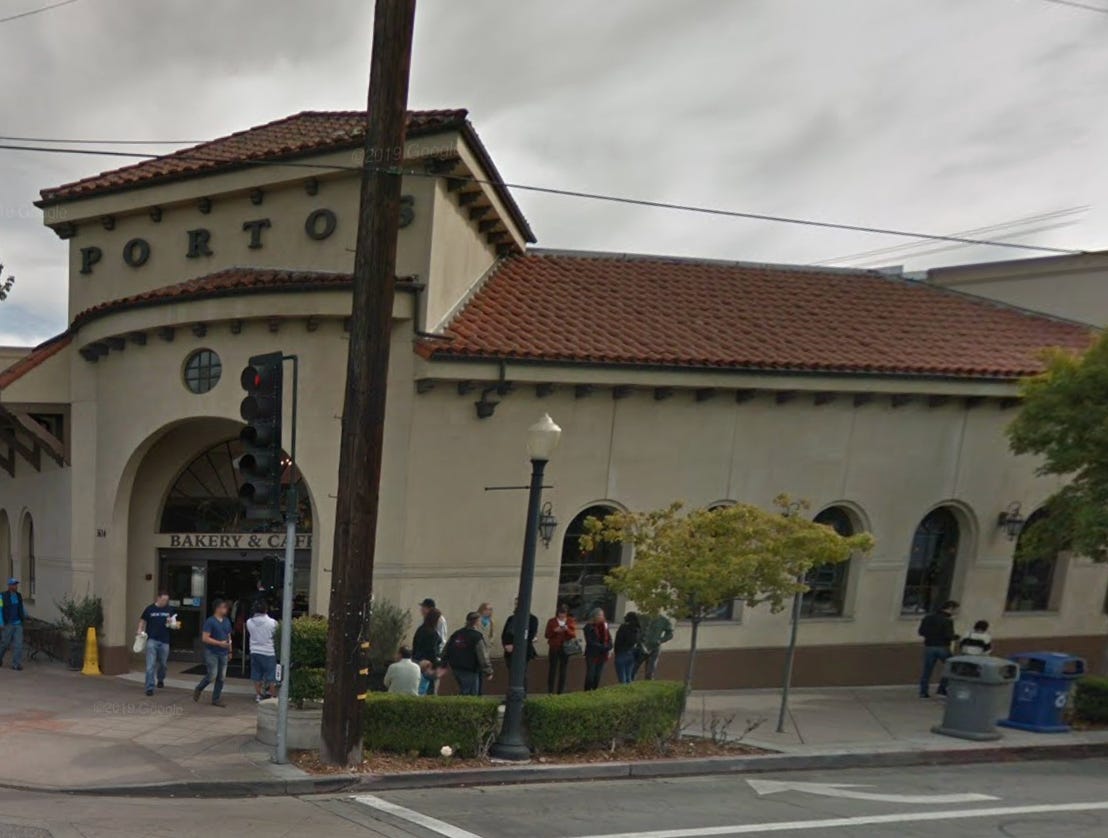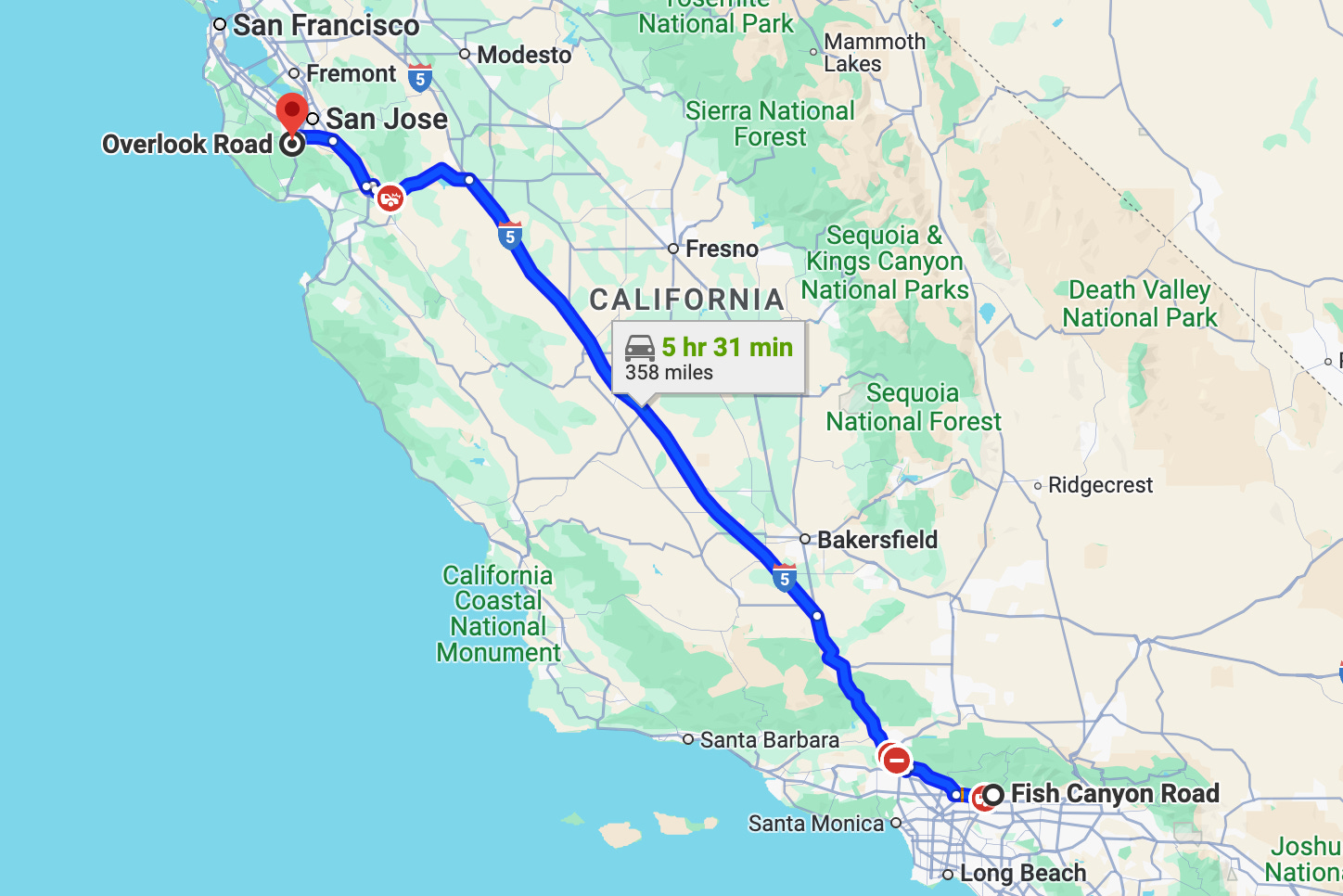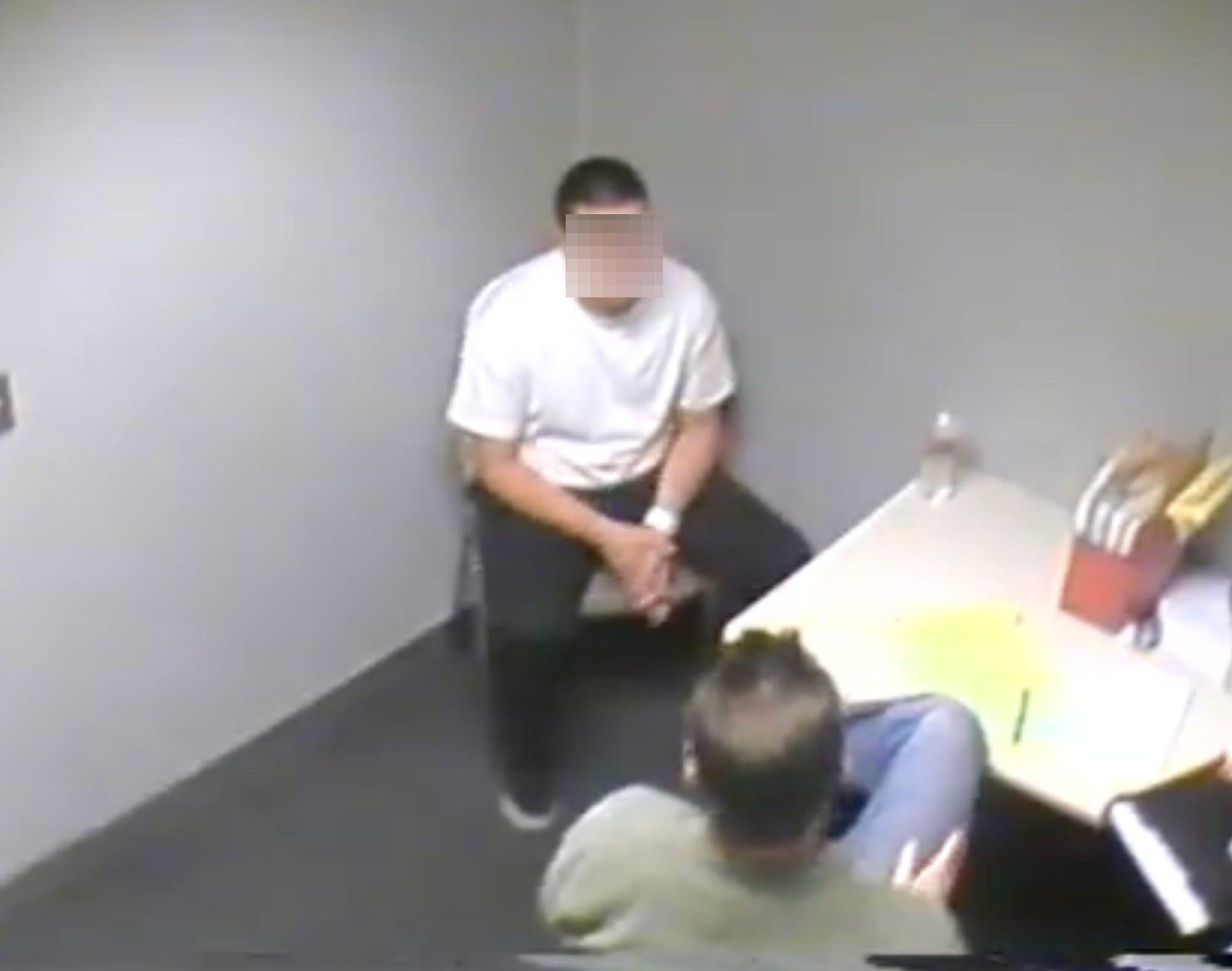If you live in So Cal, you know Portos Bakery. It’s as much a foodie landmark as In-n-Out, Philippe or Guisado’s.
A Cuban bakery that specializes in meat-filled potato balls, empanadas and guava struedels, Portos is beloved for its tasty inexpensive food and legendary for the line customers have to stand in to taste it.
It’s a famous place. In 2017, Yelp named Porto’s the “Best Bakery in America.” And, in the days before Covid-19 it was a largely cash business.
There are several stories about the early 1960s founding of the Porto’s empire by exiles from Castro’s Cuba and its growth from a mom-and-pop bakery in Silver Lake to a multi-store powerhouse with locations around L.A. and Orange County. But, the beginning of this story sits square in that week between Christmas and New Year’s Day — Dec. 28, 2007 to be exact.
Around 8:30 p.m., officers were called to Portos in Burbank at 3614 W. Magnolia Blvd. to investigate reports of a takeover-style robbery.
A group of suspects allegedly bound the hands of 13 employees with zip ties, struck one with a handgun and kicked another before forcing an assistant manager to go upstairs where two safes were kept. A large amount of cash was taken.
Eight of the 10 suspects were charged with kidnapping, robbery and false imprisonment.
There was little-to-no reporting on the case when it occurred. In fact, The Burbank Leader, the local paper, had nothing on it until October 2009, and only after a local blogger reported on it.
That’s very weird and should make you question the motivations.
When I was a cop reporter, part of the daily routine was calling watch commanders at police departments and sheriff substations in Los Angeles County at least three times in a shift.
For the most part the cops would be forthcoming. There were some cities where the cops didn’t want to say anything was ever going on. Maybe they were directed by the city council to be opaque? After all the city council in most cities has a say in who will be its police chief. The chief has a say in who will be his brass.
You can imagine the logic that leads to a lack of a sexy next-day news story:
If there’s no reporting on crime in the local rag, there’s no crime in the burg.
If there’s no crime in the burg, the burg is safe.
If the burg is safe, the chamber of commerce and citizen groups won’t be clamoring for change at the top.
If there’s no shouting for change, incumbents can run more easily for their seats.
This works at all levels of government and on a variety of issues far more complex than street crime. (Exhibit A? The border crisis).
The motivations for keeping this sort of story under wraps in Burbank could stem from any one of a number of points of civic pride. Likely it’s because Disney calls Burbank home and if folks got the idea that their little HQ town was anything other than savory, maybe they wouldn’t think so kindly of Disney. It’s a stretch, but believe me when I say PR people around the country have lost sleep over lesser problems.
We need court documents to explain exactly what happened at Portos:
Eydi Munoz was employed at Porto’s Bakery in Burbank. Munoz and two of her friends, David Monterrosa and Jorge Aguilar, agreed to rob Porto’s. Their plan called for Munoz to leave open the rear door of the bakery, which was normally kept locked.
On December 28, 2007, Munoz left the rear door open. Defendant—along with Monterrosa, Aguilar and three others—entered the bakery. They were masked and armed with handguns, and they used walkie talkies to communicate. A number of employees were present in the bakery. The employees were forced to the ground and their hands were bound. The robbers took wallets from some employees and one employee’s cell phone. The robbers forced a management employee, Braulio Garcia, to open a safe. The robbers stole $14,951.00 in cash from the safe. They also took a laptop computer and a money counting machine. A video recording of the robbery was made by the bakery’s surveillance system.
People v. Alvarenga, No. B218059, (Cal. Ct. App. Jul. 12, 2010)
Court records in another criminal case related to the Porto’s robbery say the plot took form around Thanksgiving 2007.
Jorge Aguilar, a member of the Santeria religion, operated Botanica Elegua (Botanica), an operation that performed spiritual cleansing rituals and tarot card readings.[3] Monterrosa and Eydi Munoz were friends, fellow practitioners of the Santeria religion, and Botanica customers. Aguilar knew Monterrosa and Munoz.
Around Thanksgiving 2007, Munoz, who worked at Porto's Bakery, told Aguilar and Monterrosa that she was upset that Porto's Bakery had not paid her for hours she had worked. Munoz also said that the bakery recently had made about $500,000 in one day. Monterrosa suggested that they rob the bakery.Aguilar, Munoz, and Monterrosa had four or five subsequent conversations about robbing Porto's Bakery. Other persons were present during those conversations. During one such conversation, Munoz drew a map of the inside of the bakery. Munoz said the best time to commit the robbery was after the bakery closed and the money was being counted. She said she would take out the trash through the bakery's back door, thus providing the robbers with access to the bakery.
… On December 29, 2007, Burbank Police Department officers investigating the Porto's Bakery robbery went to Botanica. A Dodge van and Dodge Intrepid were parked behind (the) Botanica. The police found empty packaging for dust masks, zip ties, a bandana, a beanie cap, a glove, and duct tape inside the van. Inside the Intrepid, the police found a cash register tray, a cash counting machine, knit caps, bandanas, paper money wraps for different denominations, I.D. cards for victims of the Porto's Bakery robbery, a replica handgun, a Porto's Bakery bank vault receipt, a check made out to Porto's Bakery, latex gloves, and zip ties …
People v. Jens B. Majano, No. B216739 (Ca. Ct. of App. Nov. 15, 2010)
Alvarenga said he was coerced by police into making an incriminating statement that led to his conviction. Many other suspects told a similar story of being “coerced” by police.
Three months later, about 350 miles north of Burbank, in Los Gatos, California police Sgts. Matt Frisby and Michael D’Antonio were investigating the March 15, 2008 slaying of local businessman Mark Achilli outside his condo in the foothills of the Santa Cruz Mountains.
They had plenty of clues. Chief among them was a map discarded near the crime scene with printed directions direct from Fish Canyon Road in Duarte, California to Achilli’s home. An informant told detectives Achilli was killed as part of a murder for hire plot. A combination of phone records, crime scene evidence and witness statements led them to Burbank and a young man named Lucio Estrada. On March 29, Lucio and his brother were arrested. The brother was later released.
Cops had already booked Paul Garcia, and alleged he was the mastermind behind Achilli’s killing. Garcia, a local mortgage banker and popular football coach, bought Mountain Charlie’s nightclub in Los Gatos from Achilli. And, they dated the same woman, Tessa Donnelly, a bartender.
Detectives speculated Garcia’s jealousy about the relationship between Donnelly and Achilli led him to plot the murder, but they needed a statement from Lucio Estrada, who they believed was the shooter.
At 2 a.m. on March 30 they began a four-hour interrogation of Lucio Estrada in a holding cell at the Burbank Police Department. The dramatic transcript reads like a play.
It begins with this:
LUCIO ESTRADA: (crying)
I've never been arrested in my life. Will someone tell me why? I'm here. It's like at 2 in the morning, they tell me it's murder.
SGT. MATT FRISBY:
You'd better relax bro. I need you to relax.
ESTRADA: (still crying)
I've never killed anybody in my life.
FRISBY:
Listen. Listen. We're gonna get to some of these things and I'm gonna talk to you about this and explain to you why we're down here.
ESTRADA:
They arrested my little brother.
FRISBY:
Listen to me. Before we do, um I'm gonna have to take care of some housekeeping stuff. You've been arrested before you understand that you, that you have rights. Correct? You understand that?
ESTRADA:
(crying).....I was beat up. I was kicked.
Estrada went on to say he was worried about his brother who also complained about having been manhandled by Burbank officers.
In his interview, which lasted about 30 minutes, Lucio’s brother had to be thinking that maybe the cops had been mistakenly linked him to the Porto’s robbery. He had nothing to do with it. Nonetheless, when they arrested the Estrada brothers, just as they had done in the Porto’s case, the Burbank detectives administered a beating.
Serving a search warrant at a Burbank apartment, cops turned up $2,000.00 in cash, two black T-Spooky 8," shirts, and books titled “A Sniper’s Journey”, "The Final Mission "How to Make a Silencer for a .45,” and “Hit Man .45," "Hit Man - A Technical Manual for Independent Contractors" and "Surgical Speed Shooting." Cops also found pot, coke, meth, a scale and a statue of Jesus Malverde — the patron saint of narcos.
Lucio’s brother took the rap for the drugs and guns, but said the books belonged to Lucio.
A rabbit hole
The Porto’s robbery exposed an ugly chapter in the history of the Burbank Police Department. Officers involved in some of the suspect interrogations complained that their brother officers had gone too far, administering beatings and other forms of cruel and unusual punishment in an attempt to get confessions and convictions.
Internal probes followed. The Burbank City Council hired outside investigators including Willdan Homeland Solutions to look into the brutality allegations.
Digging deeper there are those who believe the rash of brutality stemmed from the 2003 ambush shooting death of Burbank Police Officer Matthew Pavelka.
Two years later the feds and Burbank police responded to the shooting with an massive enforcement effort they dubbed “Operation Silent Night.”
A DEA press release, datelined Burbank and issued in June 2005 noted:
Twenty-three members of the Vineland Boys (VLB) street gang were arrested over the last 24 hours pursuant to a federal racketeering indictment that accuses them of a host of narcotic, weapon and violent crimes, including the murder of a 16-year-old witness and a Burbank Police Officer. Thirteen other defendants are already in custody, including the man accused of pulling the trigger that killed Burbank Police Officer Matthew Pavelka. Eight of the 43 indicted persons remain at large.
The arrests came early this morning as part of Operation Silent Night, in which over 1,300 law enforcement officers executed 43 search warrants, made 36 arrests, and seized 41 guns, over 12 pounds of narcotics (primarily marijuana), and $30,000 cash.
The indictment accuses a total of 35 defendants with violating RICO, the federal Racketeer Influenced and Corrupt Organizations Act. The RICO and RICO conspiracy charges outline the establishment of the gang and how it grew in power, eventually developing a reputation as one of the most violent street gangs in the San Fernando Valley. The gang, which is made up of several cliques, exercises control in parts of Burbank, North Hollywood, Sun Valley and Palmdale. The indictment also details an arrangement the gang made with the Mexican Mafia, under which the gang agreed to pay “taxes” on its drug trafficking activities.
In addition to the two RICO counts, the 56-count indictment alleges six counts of violent crimes in aid of racketeering and the murder of a police officer in relation to a drug trafficking crime. A total of seven defendants are linked to four murders, and those seven defendants are eligible for the death penalty.
The indictment also alleges several weapons and money laundering charges. Many of the defendants are also accused in a conspiracy to distribute narcotics, including cocaine, methamphetamine and marijuana. The drug conspiracy count alleges that the gang was distributing drugs in the Los Angeles area, but also in Hawaii and Indiana.
Law enforcement experts believe the action against Vineland Boyz, allowed MS-13 to expand and that expansion led to the Porto’s robbery. No doubt there is much, much more to this story and down this rabbit hole.
Maybe you could argue there was a butterfly effect.
For his part, Paul Garcia claims he was wrongfully convicted. And he has argued that he didn’t know Lucio Estrada, Robert Jacome (the man who said he drove Estrada to Achilli’s house) or Miguel Chaidez, the man who hired Jacome and Estrada.
In the next post here, we will dig into Estrada’s statement.







